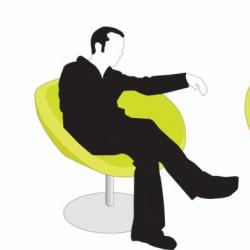Punctuation marks when addressing
In Russian, there are a lot of rules that make it easier to work with spelling. Some of them are associated with the correct spelling of letters, others - with punctuation marks. Today we will consider such a thing as a proposal with an appeal. What is an appeal? How does it stand out? How does it fit with other words in the sentence?
General concept of circulation
An appeal is either a single word or a group of words that indicate the subject to whom speech is addressed in the text. For example: "Polina, give me pudding and a cup of tea for tea."
As a rule, a sentence with an appeal is distinguished by intonation. If you read this, you will immediately understand to whom it is addressed. For example: “Ivan Karlovich, you are biting. Quickly, pull out the bait."
In more detail, in oral speech, the appeal is usually distinguished by raising and lowering the voice. That is, if one word acts as an appeal, then its first syllable has an increase in voice, and the next one - its decrease. If the appeal is presented in several words, then the voice is raised on the first of them, and on the last one, the voice is lowered.

Where can an appeal be placed in a sentence?
The address is always in the nominative case and is a noun. If we talk about its position in the text, then it can stand in a sentence:
- at first;
- in the middle;
- at the end.
Where is the appeal: examples
For example: “Svetlana, your pies seem to be burnt. Something is smoking in your kitchen." This sentence with an appeal clearly shows that the appeal - "Svetlana" - is at the very beginning of the phrase.
Another example: "Listen, Alexei Kondratievich, there is an article about you in today's press." As can be seen from this sentence, the appeal is located in the center of the utterance. In this case, the appeal will be "Alexey Kondratievich."
For example: “How late you told me about the exam, Slavik. I won't be able to prepare for it." This sentence with an appeal (the word "Slavik"), as you can see, is at the very end.

How is the appeal distinguished in the proposal?
As it becomes clear from the examples, appeals are distinguished by punctuation marks. Moreover, if it stands at the beginning and is calmly pronounced, then on the one hand it stands out with a comma (the punctuation mark is placed after the appeal). If it has a similar arrangement, but is pronounced with a special feeling, then an exclamation mark is placed after it. For example: “Friends! We are glad to tell you good news. From tomorrow we will have two days off a week.
Please note that after "Friends!" are distinguished by an exclamation point, the next word begins with a capital letter.
If the appeal is in the middle of a phrase or sentence, it is separated from both sides by commas. The previous sentence with an appeal (“Listen, Alexei Kondratievich ...”) clearly demonstrates this.
The appeal at the end of the sentence is separated by a comma on one side only. In this case, a comma is placed before the call.
What is the purpose of the call in the test?
Usually, sentences with appeals are used to attract the attention of a particular person. In addition, it is with the help of the appeal that you can demonstrate your attitude towards any person. For example: “Honey, pay attention! I've been walking under the window for the second hour. Open the doors."
In literature, it is often possible to refer to an inanimate object with the help of address. For example: “Tell me the wind, is it possible to feel the need for communication and love?”

Sometimes there are interesting proposals with appeals. In particular, we are talking about sentences that use not one, but several calls at once. For example, "Come on, my darling, Martyn Petrovich, let's find a place to sleep for today."
The address itself is not a member of the sentence, but it can have words dependent on itself. For example: “My dear friend and devoted comrade! A lot depends on your decision today.” At the same time, in the first part of the text (before the exclamation mark), we see the appeal “Friend and comrade”, which is bordered by additional words.
An appeal can refer to one or several subjects at once. In such cases, "and" is placed between these calls. For example: “Kolya and Igor, today it’s your turn to be on duty in the classroom. Take out the trash and dust off the bookshelves." In this case, the appeal is "Kolya and Igor."
In addition, references can be repeated in the same sentence. For example: "Lena, Lena, aren't you ashamed?!"
Often, before the conversion, you can see the interjection particle "o". For example: “Do not despair, O friend. Everything will be alright!"

How sentences with an appeal are separated in business letters: examples
When compiling business documentation, appeals are also used. As a rule, they are written separately from the rest of the text and are marked with an exclamation point. Eg:
Dear users of the Internet provider "XXX"!
The company "XXX" LLC reminds that from 20.07.2015 to 21.07.2015 it carries out preventive maintenance. As a result, the Internet will not work.
At the same time, pay attention to the fact that our appeal already includes the word “respected”, therefore, it is not separated by commas. Another example:
Hello dear subscriber!
Firm "UUU" is pleased to inform you that you can now pay for our services without commission in your personal account.
In this example, you can see that “dear subscriber” acts as a call. In this case, "hello" is not included in the address. It is a bright predicate and therefore stands out with a comma. Similar sentences with an appeal (you can see examples in our article) clearly demonstrate the location of appeals in business letters.

How are introductory words written?
Introductory words are sentences or phrases that introduce a special shade of modality into the text. At the same time, they refer either to certain members of the proposal, or to the proposal as a whole. In addition, water words can convey uncertainty and confidence, as well as other feelings (joy or sadness, admiration). An example of introductory words: "We will certainly keep our promise to raise your wages next month."
Introductory words, which are separated by commas, can be used in sentences along with appeals. Here is one example of a sentence with appeals, introductory words:
It seems, Ivan Petrovich, in this case you have absolutely no control over the question. We will have to turn to a more knowledgeable person.
In this example, “it seems” acts as an introductory word, while the appeal here is “Ivan Petrovich”. In this case, the introductory word is at the beginning of the sentence and, therefore, is separated by a comma on one side. The second comma in this text refers to our appeal.
Here is another example where the introductory word is at the beginning, and the appeal is in the middle:
Looks like your game is lost, dear friend.
Examples of what introductory words can convey:

How does addressing feel next to interjections?
In Russian, there are sentences with appeals and interjections. Recall that interjections are a certain part of speech that serves to endow expressions and sentences with some kind of emotion. Interjections include such short words as: “Oh!”, “Ah!”, “Fathers!”, “Ay!” - and others.
If, together with an interjection in a sentence, there is an appeal, then the first is distinguished by an exclamation mark, and the second by a comma or commas. For example: “Alas! Ivan, Makarovich, your letter was handed over by messenger yesterday.
If the sentence contains the interjection "o" and it is before the appeal, then the exclamation point is not put. For example: “Oh, gods, is it possible to spend hard-earned money like that ?!”
In addition, often an appeal can stand next to an interjection, and then a comma and an exclamation mark are not put between them. For example: "Oh, you, and I had a better opinion of you."
In conclusion, we say that the appeal gives the proposal a special sound. It goes well with both its own kind and other parts of speech. Now you know how sentences are written with appeals and introductory words, as well as with interjections.
Appeal- this is a word or phrase that names the person (less often - the subject) to whom the speech is addressed.
1. Appeal can be expressed in one word and more than one word.
One word address is expressed by a noun or any part of speech in the function of a noun in the nominative case, an ambiguous treatment may include words dependent on this noun or an interjection about:
For example:
Dear granddaughter, why did you rarely call me?
Waiting for a flight from Sochi, go to the arrivals area.
Again I am yours, oh young friends! (the title of the elegy of A. S. Pushkin).
2. An appeal can be expressed by a noun in the form of an oblique case, if it denotes a sign of the object or person to whom the speech is addressed.
For example: Hey, in a hat, are you extreme?
Appeals can be expressed by special, descriptive phrases, which are distinguished as ordinary address-names: - Hey, on the scow!- said Reg (Green); - Hey, who is stronger, come here to the gate(P. Kapitsa).
3. Personal pronouns you and you, as a rule, do not act as appeals: they perform the function of the subject if they have predicate verbs.
For example: If you, the reader, love autumn, then you know that in autumn the water in the rivers acquires a bright blue color from the cold.(Paust.) - the appeal is reader, and the pronoun You combined with the verb you love.
Pronouns You , You can take on the call function in the following cases:
A) in constructions with a separate definition or a defining clause: You are the third from the edge, with a mop on his forehead, I don't know you. I love you!(Ascension); You, whose wide overcoats resembled sails, whose spurs rang merrily and voices, and whose eyes, like diamonds, left a mark on the heart, are the charming dandies of bygone years.(Color);
b) when used independently, usually with interjections hey, well, eh and etc.: Oh, you women, women! Gardening your heads(Cool.); - Oh, you! And don't you mind sitting next to Chebuhayka? - he throws on the go(Cool .); Tsyts, you! She is no longer your servant(M. G.); “He has a headache,” Bayev sympathized with his heart. – Eh-h... you. Residents!(Shuksh.);
V) as part of other requests: Dear friend you are mine don't be ashamed...(Fad.); You are my dear(Shuksh.).
The appeal is not grammatically related to the sentence, is not a member of the sentence.
Punctuation marks when addressing
1. Appeals are usually distinguished (or separated) by commas, and with a special emotional load - by an exclamation point after the appeal.
For example: Congratulations, comrades, on a safe arrival(paust.)
- Don't go, Volodya, - said Rodion(Ch.).
Farewell, it's time, my joy! I'll jump off now, conductor(Past.) . Calm down, wind. Don't bark, water glass(Es.). See clearly, comrade sighted, by the lake in the drain of water(Ascension).
The vocative intonation is enhanced if the appeal is placed at the end of the sentence.
For example:
- Hello, brothers! - he said(Ch.);
Farewell, it's time for the outskirts! Life is a change of ashes(Ascension).
2. Multiple hits are separated by commas or exclamation marks.
For example: " My dear, my dear, my torment, my anguish ", - she read (Ch.); Goodbye, my happiness, my short happiness! (Cupr.); Proletarian! Poor brother... When you receive this letter, I will already be flying away(Ch.).
Appeals connected by union And , are not separated by a comma.
For example: cry, tavern violins and harps (Vozn).
3. If after the appeal there is a definition or application, then it is isolated; such a definition is perceived as a second appeal.
For example: Grandpa, dear where have you been? (rasp.); Miller, darling, get up. On the shore of the lights! (Paust.).
4. Parts of the dissected address are allocated separately, each in itself.
For example: Hear me good, hear me beautiful, my evening dawn, unquenchable love! (Is.); ABOUT, my neglected thank you and kiss you hands of the Motherland, timidity, friendship, family (Past.).
5. If the appeal ends an interrogative sentence, then a question mark is placed after it.
For example: Hear Dmitry Petrovich? I will come to you in Moscow(Ch.); When will Kara-Ada finally be, captain?(Paust.); What's wrong with you, blue sweater?(Ascension); Did you pray at night, birch? Did you pray at night overturned lakes Senezh, Svityaz and Naroch? Did you pray at night Cathedrals of the Intercession and Assumption? (Ascension).
6. Particles oh ah ah and others facing appeals are not separated from them.
For example: Oh my darling my gentle, beautiful garden! (Ch.).
- Prosh, and Prosh! - Called Prokhor Abramovich(Plat.).
Oh Nadya, Nadya we would be happy...(OK.).
Oh whirlwind, feel all the depths and hollows(Past.).
O bunch of retribution! Tossed in one gulp to the West - I am the ashes of an intruder!(Ascension).
Oh youth, phoenix, fool, all in flames cum!(Ascension).
O heart-loving deceptions, delusions of infancy! On the day when the glades turn green, I have no deliverance from you.(Ill.).
7. If there is an interjection before the appeal (unlike a particle, it is accented), then it is separated by a comma or an exclamation mark.
For example:
- Oh, dear Nadia, - Sasha began his usual after-dinner conversation(Ch.);
- Hey, three octopuses for threading, go get the bolt! - From that day on, Zakhar Pavlovich was called the nickname "Three Octopuses for Carving"(Plat.). The word o can also act as an interjection (meaning Oh ): ABOUT, my lost freshness, riot of eyes and flood of feelings (Es.).
An interjection (as a call to attention) can itself act as an appeal.
For example: Hey watch out! Make a closure!(Ascension).
- Hey, be careful out there! shouted Stepakha.(Cool.).
Where? What are you? Hey!(Shuksh.).
8. After the appeal, which is a separate vocative sentence (Sentence-address, i.e., a one-part sentence in which the main and only member is the name of the person addressing the speech), an ellipsis or an exclamation mark is placed - single or in combination with ellipsis.
For example: - Miller! whispered Shatsky.(Paust.); Anya, Anya!(Ch.); - Sing! .. - Lyalka is again in the window(Shuksh.);
- Mother ... And mother! he called his old woman(Shuksh.); “Brothers ...” he said quietly, and his voice broke(Paust.).
It is distinguished by a comma, or (if it is colored emotionally) - by an exclamation mark. For example: “Children, open your notebooks and get ready to write down the topic of the lesson” or “Vasiliev! I immediately got up and left the classroom.
Despite the fact that the appeal is not a member of the proposal, it can be common (that is, have dependents). In this case, the appeal is highlighted in its entirety - also, . For example: "My beloved husband, in the first lines of the letter to tell you ...".
When parsing a sentence, do not underline the appeal with any line. Only members of the sentence should be underlined, and appeals, like introductory words, are not connected with the sentence from the point of view of grammar, are not its members and are not included in the syntactic scheme of member dependencies. However, check with your teacher, as many of them require you to designate invocations in some way - for example, by placing "address" above them, bracketing them, or using other methods.
An address is a word or a combination of words that names the addressee of the speech. A distinctive feature of this construction is the grammatical form of the nominative case. In addition to defining an object, animate or inanimate, an appeal may contain an evaluative characteristic and express the attitude of the speaker to the addressee. To establish the role of words naming the person to whom the speech is addressed, it is necessary to find out what features this construction can “possess”.

Most often, proper names, names of persons according to the degree of kinship, according to, position in society, position, rank, according to the relationship of people act as an appeal. Less often, animal names, names of inanimate objects or natural phenomena are used as an appeal, usually personified in the latter case. For example:
“You know, Shurochka, I have something to tell you.” In the role of address - a proper name.
- "My brother! How glad I am to see you!" Appeal names a person according to the degree of kinship.
- "Where did you take me,?" The word "ocean" is naming an inanimate object. Such constructions are used in artistic speech, making it figurative and expressive.
In oral speech, the appeal is formalized intonation. For this, different types of intonations are used.
The vocative intonation is characterized by increased stress and the presence of a pause after the appeal. In written speech, such intonation is a comma or an exclamation mark. (My friend, let us dedicate our souls to the homeland with wonderful impulses!)
Exclamatory intonation is usually used in a rhetorical address, naming a poetic artistic image. (Fly, memories!)
Introductory intonation is distinguished by a lowering of tone and a fast pace of pronunciation. (I'm terribly glad, Varenka, that you stopped by to see me.)
If in colloquial speech the main function of addresses is to give a name to the addressee of speech, then in fiction they perform stylistic functions and are carriers of expressive and evaluative meanings. (“Where are you going, thieves’ mug?”; “Good, beloved, we are far from each other.”)
The metaphorical nature of poetic appeals also determines the features of their syntax. For example, common and homogeneous appeals are often used in artistic speech (Hear me, good, hear me, my evening dawn, inextinguishable.) Often they give speech intimacy, special lyricism. (Are you still alive, my old lady?)
Please note that the grammatical form of the appeal coincides with the subject and application. They should not be confused: the subject and the application are members of the sentence and a question is asked to them. An appeal is a construction that is not grammatically related to other members of the sentence, therefore it does not play a syntactic role and a question is not posed to it. Compare:
"Her dreams were always romantic." The word "dreams" is the subject of the sentence.
"Dreams, dreams, where is your sweetness?" This is a syntactic construct.
Related videos
Rules of Russian spelling and punctuation. Complete academic reference book Lopatin Vladimir Vladimirovich
PUNICATION SIGNS FOR APPEALS
Section 101. Appeal, i.e. words and combinations of words that name the addressee of the speech, is highlighted (or separated) commas. With increased emotionality, Exclamation point after applying: Congratulations, comrades, with safe arrival(Paust.); - Do not go, Volodya- said Rodion(Ch.); open up thought! Be the music word, strike at the hearts, so that the world triumphs!(Ill.); I will jump now conductor (B. Past.); calm down wind. Don't bark, water glass(Her).
Multiple calls are separated by commas or exclamation marks: "My dear, my dear, my torment, my anguish", - she read (Ch.); Farewell, my happiness, my short-lived happiness!(Cupr.); Proletarian! Poor brother... By the time you receive this letter, I will already be on my way.(Ch.); - Father! Semyon Yakovlevich!- came suddenly ... the voice of a lady(Dost.). Appeals connected by the union and are not separated by a comma: cry, tavern violins and harps, over a black aster with an Afro hairstyle(Ascension).
If after the appeal there is a definition or application, then it is isolated; such a definition is perceived as a second appeal: Grandfather, cute, where have you been?(rasp.); - Miller darling, get up. On the coast of fire!(Paust.).
Parts of the dismembered appeal are distinguished separately, each on its own: Hear me, good, hear me, beautiful, my evening dawn, unquenchable love! (Is.).
If an appeal ends an interrogative sentence, then a question mark is placed after it: Hear Dmitry Petrovich? I will come to you in Moscow(Ch.); What's wrong with you, blue sweater? (Ascension); Did you pray at night birch? Did you pray at night overturned lakes Senezh, Svityaz and Naroch? Did you pray at night Cathedrals of the Intercession and Assumption? (Ascension).
§ 102. Particles oh ah ah and others before the appeals are not separated from them: Oh my sweet, my tender, beautiful garden (Ch.); Oh Nadya, Nadya we would be happy...(OK.); O beloved deceptions of the heart, delusions of infancy! On the day when the glades turn green, I have no deliverance from you.(Ill.); O sun, red-hot beyond measure fade away, have mercy on the poor earth!(Ill.); Death and death Will you give me one more word to say?(TV).
§ 103. If there is an interjection before the appeal, then it is separated by a comma or an exclamation mark: Ah, my fields, dear furrows you are good in your sorrow(Ec.); - Hey, three octopuses for threading go get the bolt! - From that day on, Zakhar Pavlovich was called the nickname "Three Octopuses under the Carving"(Plat.). The word can also act as an interjection O(in meaning Oh): Oh, my lost freshness, riot of eyes and flood of feelings (Es.).
Note. Homonymous particles and interjections ( oh ah ah) differ as follows: the particle has an amplifying value and is not separated from the address intonationally (it does not have an independent stress); on the contrary, interjections are intonationally independent, percussive, after which there is a pause. Wed: About my cherished field you are now resting after the harvest(Aitm.) - Oh wind! Oh snow storms! (Bl.).
Interjection Hey(as a call for attention) can itself act as an appeal: - Hey, beware! Make a closure!(Ascension); - Hey be careful there! - Shouted Stepaxa(Cool.); - Where? What are you? Hey!.. (Shuksh.); - Hey! It is forbidden! Frosya got scared(Current.).
§ 104. After appeals, which are an independent proposal, put ellipsis or Exclamation point- single or combined with ellipsis: - Miller!- whispered Shatsky(Paust.); - Sing!..- Lyalka is in the window again(Shuksh.); - Mother ... And mother! he called his old woman(Shuksh.).
It is customary to make appeals in official letters on a separate line, after the call is put Exclamation point: Dear comrade (mister) V. V. Ivanov!; Dear Colleagues!
Section 105. Personal pronouns You And You usually do not act as appeals: they perform the function of the subject if they have predicate verbs: If You, reader, love autumn, then you know that in autumn the water in the rivers acquires a bright blue color from the cold(Paust.) - pronoun You- subject ( you love), A reader- explanatory member of the sentence ( You, i.e. reader).
Pronouns you you can serve as a referral in the following cases:
a) in the presence of definitive constructions - separate definitions or definitive clauses of the sentence: You, the third from the edge, with a mop on your forehead, I do not know you. I love you(Ascension); You, whose wide overcoats resembled sails, whose spurs rang merrily and voices, and whose eyes, like diamonds, left a mark on the heart, are the charming dandies of bygone years.(Color.); such pronouns are not subjects; they do not have verb-predicates;
b) when used independently, usually with interjections hey, uh, uh, poof etc. (colloquially): - Chick, you! She is no longer your servant(M. G.); - Hey, you! Answer me(Shuksh.); - Well, you! Don't cross me!
c) in complex appeals: Dear friend you are mine don't be ashamed...(Fad.); Manyushka, you are my dear… (Shuksh.).
§ 106. As appeals, descriptions of the signs of an object, a person can be used. Such invocations are distinguished as ordinary invocation-names: - Hey, on the scow! Reg said.(Greene); - Hey, who is stronger Come here, to the gate!(P. Kapitsa).
From the book Handbook of the Russian language. Punctuation author Rosenthal Ditmar Elyashevich§ 51. Punctuation marks during dialogue 1. If the replicas of the dialogue are given each from a paragraph, then a dash is placed in front of them: - So, is the German calm? - Silence. - Rockets? - Yes, but not very often (Kaz.) .2. If the replicas follow the selection without indicating to whom they belong, then each of them
From the book Great Soviet Encyclopedia (ZN) of the author TSB§ 71. Alternative punctuation marks 1. With complex subordinating conjunctions, a comma is placed once - either before the entire union, or, depending on the meaning, intonation, certain lexical conditions, before the second part (the first is part of the main part
From the book Modern Russian. Practical guide author Guseva Tamara Ivanovna§ 72. Variable punctuation marks Often in the press there is a different punctuation design of similar texts. For example, it was said above that different punctuation marks can precede the connecting construction: comma, dash, period, ellipsis (see § 24,
From the book Spelling and Style Guide author Rosenthal Ditmar Elyashevich From the book A Guide to Spelling, Pronunciation, Literary Editing author Rosenthal Ditmar Elyashevich7.49. Punctuation marks in direct speech Direct speech can be framed in two ways - using the paragraph selection of each new replica and in the selection, in the line. after the words of the author preceding the dialogue
From the book Rules of Russian Spelling and Punctuation. Complete Academic Handbook author Lopatin Vladimir Vladimirovich7.52. Punctuation marks separating and highlighting The set of punctuation marks in Russian writing is small: dot, exclamation and question marks, comma, semicolon, colon, dash, brackets, quotation marks. The function of a punctuation mark is also a paragraph - an indent from
From the book Rock Encyclopedia. Popular music in Leningrad-Petersburg, 1965–2005. Volume 1 author Burlaka Andrey Petrovich§ 123. Punctuation marks during dialogue If the replicas of the dialogue are given from a new paragraph, then a dash is placed before them, for example: - Do you have relatives? - There is no one. I am alone in the world. - Do you know grammar? - Yes. Do you know any language other than Aramaic? - I know. Greek (Bulgakov). If
From the author's book§ 123. Punctuation marks during dialogue 1. If the replicas of the dialogue are given from a new paragraph, then a dash is placed in front of them, for example: - So, is the German calm? - Silence. - Rockets! - Yes, but not very often (Kazakevich) .2. If the replicas follow the selection without indicating who they belong to, then
From the author's bookPUNCUNCATION AT THE END AND AT THE BEGINNING OF A SENTENCE. ENDING SIGNS IN THE MIDDLE OF A SENTENCE Punctuation marks at the end of a sentence § 1. Depending on the purpose of the message, the presence or absence of emotional coloring of the statement, a period is put at the end of the sentence
From the author's bookPunctuation marks at the beginning of a sentence § 4. At the beginning of a sentence, to indicate a logical or meaningful break in the text, a sharp transition from one thought to another (at the beginning of a paragraph), an ellipsis is placed: But only the wheels rattled in the black void: Ka-ten-ka,
From the author's bookpunctuation marks for the nominative topic § 23. The nominative case (the nominative of the topic or presentation) as a syntactic structure before the sentence, the topic of which it represents, is separated by punctuation marks corresponding to the end of the sentence - a dot,
From the author's bookPunctuation marks for homogeneous applications § 42. Applications (definitions expressed by nouns) that are not connected by unions can be homogeneous and heterogeneous. Applications that precede the word being defined and indicate close features of the subject,
From the author's bookPunctuation marks for inserts § 97. Inserted constructions (words, combinations of words, sentences) are distinguished by brackets or dashes. They contain additional information, comments, clarifications, explanations, amendments to what has been said; explain, interpret the main part of the statement: Since 1851
From the author's bookPunctuation marks in direct speech § 133. Direct speech, that is, the speech of another person, included in the author's text and reproduced verbatim, is drawn up in two ways.1. If direct speech goes into a line (in a selection), then it is enclosed in quotation marks: “I regret that I did not know your father, -
From the author's bookPunctuation marks in quotations § 140. Quotations are enclosed in quotation marks and punctuated in the same way as direct speech (see § 133-136): a) Marcus Aurelius said: “Pain is a living idea of pain: make an effort of will to change it's a show, put it down, stop it
From the author's bookPUNCIATION MARKS The PUNICATION SIGNS group was born in June 1988 as a kind of reaction to a change in the musical course in the popular St. Petersburg group of the second half of the 80s JUNIOR BROTHERS - from melodic neo-romanticism and electropop towards hard guitar
Appeal- this is a word or phrase that names the person to whom or to what the speech is addressed. For example: Wouldn't you chase, pop, for cheapness(Pushkin).
The main purpose of the appeal is to attract attention, although sometimes the appeal can express an attitude towards the interlocutor. For example: What are you doing sweetie?(Ostrovsky).
In one sentence, there can even be several calls directed to the same addressee, one of which only names the listener, and the other evaluates, for example: Go, my dear, Ilya Ilyich!(Goncharov).
Sometimes in poetic speech, rhetorical personification-address is possible. It calls on an inanimate object to become a participant in communication. For example: Noise, noise, obedient sail, Wave under me, gloomy ocean.(Pushkin.)
The appeal is not a member of the sentence, but may have dependent words, that is, be common, for example: Low house with blue shutters, I will never forget you!(Yesenin).
In the letter, appeals are separated by commas. If the appeal is emotionally colored and is at the beginning of the sentence, then it may be followed by an exclamation point. Compare the examples below:
What, daddy, got up so early? (Pushkin)
Guys! Isn't Moscow behind us? (Lermontov)
In official letters, appeals are usually written on a separate line. In this case, an exclamation mark is placed after the appeal. For example:
Dear Ivan Ivanovich!
Please note: the word DEAR is included in the appeal and is not separated by a comma. Compare:
Hello Ivan Ivanovich!
In this example, after the word HELLO, a comma is needed, since it is not part of the appeal, but acts as a predicate.
Interjection- This is a special part of speech that serves to express various feelings and volitional impulses. This part of speech includes the words AY!, AH!, Alas!, BATYUSHKI! and others.
Interjections, like appeals, are not members of a sentence, and are separated in writing by a comma or an exclamation point.
Alas! His confused mind could not resist the terrible upheavals (Pushkin).
Life, alas, is not an eternal gift (Pushkin).
Like many spelling rules, this rule has an exception that needs to be remembered. If the interjection O in a sentence comes before an appeal, then a comma or an exclamation mark is not placed between the interjection and the appeal. Compare:
Oh, why am I not a bird, not a steppe raven! (Lermontov).
Your holy sentence, oh heaven, is not right (Lermontov).
In addition, you need to know that sometimes interjections are part of whole combinations, for example: EH YOU, EH YOU, WELL, AY YES. In this case, commas are not needed, for example: Well, what to do now?
Exercise
- What do you need, old man? (Pushkin).
- Tsyts_ damned_ how there is no death on you (Turgenev).
- Have mercy_ empress fish (Pushkin).
- You_ queen_ are sweeter than all, blush and whiter (Pushkin).
- You stupid demon_ where did you climb after us? (Pushkin).
- Farewell, free element! (Pushkin).
- But what about_ father_ Ilya Ilyich_ I will arrange? (Goncharov).
- And look into his face: fu_ what importance shines in his eyes! I have never heard him say an extra word (Gogol).
- Yeah_ You yourself admit that you are stupid (Pushkin).
- What are you_ guests_ bargaining for and where are you sailing now? (Pushkin).
- Ba_ familiar faces! (Griboyedov).
- Hello, you are my beautiful prince! (Pushkin).
- Ah_ you_ vile glass! You are lying to spite me (Pushkin).
- Sovereign, you are our_ Vladimir Andreevich_ I, your old nanny, decided to report to you about papa's health (Pushkin).
- Barin_ would you order me to return? (Pushkin).
- Well_ Maksimych_ go with God (Pushkin).
- Saints_ how she was dressed! Her dress was white as a swan: fu_ what a magnificent! and as she looked: the sun_ by God_ the sun! (Gogol).
- O_ gods_ gods_ why are you punishing me? (Bulgakov).
- O_ do not believe this Nevsky Prospekt! (Gogol).
- The wind twisted the sand, the water rippled, turned cold, and, looking at the river, Palaga whispered: “God_ yes, soon, soon frost!” (Yesenin).
- Don't you have at least the Pogodin edition_ General? Then I wrote here in a different font: this is a round, large French font, of the last century ... (Dostoevsky).
- Wow, what a voice! (Gogol).
- “Where is it_ you_ beast_ cut off your nose?” she shouted with anger (Gogol).
- - Oh, hero! We all lined up in front of You in a line one at a time in order to express our admiration for Your bold and completely senseless act (Klyuev).
- “Stop_ Praskovya Osipovna! I will put it, wrapped in a rag, in a corner: let it lie there a little; and then I’ll take it out” (Gogol).
- Behind me, reader! Who told you that there is no true, true, eternal love in the world? (Bulgakov).
- “Neither give nor take, a copy from Inconsolable Grief, a copy from you_ Erofeev,” I immediately thought to myself and immediately laughed to myself (Erofeev).
- He placed them in front of me, opened my potion bag, and announced that he would try every potion on these kids until he found the right one. This is how the king_ don Rumata was poisoned ... (Strugatskys).
- How happy I am that I left! Dear friend, what is the human heart? I love you so much: we were inseparable, and now we parted, and I rejoice! (Goethe).
- On the fourth day I arrived here_ dear friend_ and, as promised, I take up my pen and write to you (Turgenev).
- - Well, brother Grushnitsky, it's a pity that I missed! - said the captain ... (Lermontov).






